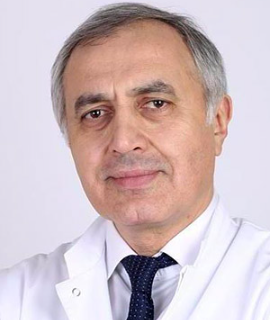Ismail Osmanov, Children's city clinical hospital, Russian Federation
Virus-neutralizing monoclonal antibodies (mAbs) are designed to create a passive or enhance the natural immune response against a foreign agent. For the first time, the introduction of monoclonal antibodies to children for the treatment of new coronavirus infection (hereinafter r [....] » Read More






Title : Diagnosis and differentiation of lyme disease and tick-borne relapsing fever borreliosis with multiplex line immunoblots
Ranjan Ramasamy, IDFISH Technology, United States
Lyme disease (LD) is caused by certain species of tick-borne bacteria of the genus Borrelia termed Lyme disease Borreliae (LDB). LD often causes chronic debilitating infections that are difficult to diagnose by clinical symptoms alone. The detection of serum antibodies to specifi [....] » Read More
Title : Mast cell degranulation links anti-PEG IgE to anaphylaxis caused by PEGylated drugs and PEG-contained LNP/mRNA COVID vaccines
Zhaohua Zhou, Food and Drug Administration, United States
Polyethylene glycol (PEG)- modification (PEGylation) is a highly successful strategy for improving the therapeutic properties of protein products. PEGylation increases protein size, inhibits proteolysis and decreases renal filtration, thereby improving the pharmacokinetics (half- [....] » Read More
Title : Genetic factors influencing early immunity to SARS-CoV-2 in the upper respiratory tract
Ranjan Ramasamy, IDFISH Technology, United States
The nasal epithelium is the initial site of SARS-CoV-2 infection. Early and effective immune responses in the upper respiratory tract (URT) can limit and eliminate the infection in the URT, thereby preventing infection of the lower respiratory tract and the development of severe [....] » Read More
Title : Generation and application of humanized mouse tumor models to expedite translational research for Immuno-Oncology
WenQing Yang, Founder/Chief Scientific Officer, ClinBridge Biotech Corp., China
With the revolutionary progress of cancer immunotherapy, more clinically relevant preclinical animal models are needed to support the efficacy assessment, MOA elucidation and translational research for immune-oncology (I/O) drugs. Humanized murine models have been developed to st [....] » Read More
Title : Rise in allergies in Goa post Covid – 19
Roque Gabriel Wiseman Pinto, Medical College, India
COVID – 19 (SARS – CoV-2) Severe Acute Respiratory Corona Virus, has caused a pandemic world wide and changed the Health Care and the Disease profile scenario world wide. The effects are due to the COVID 19 Disease Vaccination Long COVID &ndash [....] » Read More
Title : The effect of subcutaneous omalizumab therapy on the allergic conjunctivitis symptoms of patients being treated for asthma
Esin Kirikkaya, Health Sciences University İzmir Tepecik Training and Research Hospital, Turkey
Purpose: To evaluate the effect of subcutaneous omalizumab therapy on the allergic conjunctivitis symptoms of patients being treated for asthma. Methods: A total of 84 eyes of 42 patients who were receiving subcutaneous omalizumab therapy for asthma and complained of a [....] » Read More
Title : Differentiation discoid lupus erythematosus associated-scaring alopecia from lichen planopilaris by immunostaining of CD123 marker
Maliheh Amani, Department of Dermatology, Gonabad University of Medical Sciences, Iran (Islamic Republic of)
Introduction: Scarring alopecia (cicatricial alopecia) refers to disorders that are characterized by the irreversible destruction of hair follicles and permanent alopecia. Scarring alopecia is categorized into primary and secondary. Primary scarring alopecia (cicatricial alo [....] » Read More
Title : Altered systemic and intestinal IgA immune responses in individuals with type 1 diabetes
Juan Huang, Yale University, United States
Objective: Increasing evidence supports the observation that IgA exerts a critical effect on the susceptibility to autoimmunity by modulating gut homeostasis and subsequent host immunity. We hypothesized that the IgA immunity is altered in individuals with type 1 diabetes. [....] » Read More
Title : Cardiac and vascular dysfunction in patients with multiple sclerosis
Marina Awad Zaher, Beni-Suef University, Egypt
Background: Much concern was directed towards studying cardiovascular dysfunction in patients with multiple sclerosis (MS). However, the mechanisms of such dysfunction are not completely elucidated. Aim of the work: The aim of our work was to assess cardiac and arterial [....] » Read More
Title : The immunomodulatory effects of Frankincense extract in suppression of experimental autoimmune encephalomyelitis
Gholamreza Anani Sarab, Birjand University of Medical Sciences, Iran (Islamic Republic of)
Background: Multiple Sclerosis (MS) is a chronic neurodegenerative disease of the central nervous system. The main feature of this disease is the formation of inflammatory lesions in the white matter of the brain and spinal cord due to inappropriate immune responses against the m [....] » Read More
Title : Autoptic findings in VITT (Vaccine-induced Immune Thrombotic Thrombocytopenia alias Vaccine Induced Thrombosis with/without Thrombocytopenia)
Luca Roncati, University of Modena and Reggio Emilia, Italy
Vaccine-induced Immune Thrombotic Thrombocytopenia (VITT), also known as vaccine-induced prothrombotic immune thrombocytopenia (VIPIT) or vaccine-associated thrombotic thrombocytopenia (VATT) or thrombosis with thrombocytopenia syndrome (TTS), is a rare potentially lethal blood c [....] » Read More
Title : Safe and effective immunotherapy by targeting CTLA-4
Xuexiang Du, Shandong University School of Basic Medical Sciences, China
Cancer immunotherapy is becoming a powerful and acceptable treatment to malignant tumor in addition to traditional methods such as surgery, radiotherapy and chemotherapy. Anti-CTLA-4 monoclonal antibodies confer a cancer immunotherapeutic effect (CITE) but cause severe immunother [....] » Read More
Title : Methotrexate nanoparticles ameliorate Freund’s complete adjuvant induced arthritis in Wistar rats
Bushra Akhtar, University of Agriculture, Pakistan
Rheumatoid arthritis (RA) is a chronic autoimmune disease and is characterized by inflammation, tissue damage and functional impairment. Methotrexate (MTX) is used in treatment of RA but numerous adverse effects are associated with its use. It has fast clearance as well. These fa [....] » Read More
Title : Immunological disorders due to occupational exposures
Amal Saad Hussein, Environment & Climate Change Research Institute, National Research Centre, Egypt
Immune disturbances are described among wide variety of occupational exposures to chemical, biological or physical pollutants. Several studies have shown that occupational chronic exposure to pesticides, mycotoxins, organic solvents, dyes, heavy metals; such as mercury, cadmium, [....] » Read More
Title : Cytopathological assessment is an accurate method for identifying immunophenotypic features and BRCA1/2 mutations of high-grade serous carcinoma from ascites
Miceska Simona, Institute of Oncology Ljubljana, Slovenia
Background: High-grade serous carcinoma (HGSC) is the most common and aggressive type of ovarian cancer, and is often associated with ascites at presentation. Our objective was to evaluate the accuracy of cytopathology to identify immunophenotypic features of HGSC and BRCA1/2 mut [....] » Read More
Title : Kaposi Sarcoma Associated Immune Reconstitution Inflammatory Syndrome (Ks-Iris) – Recognition And Treatment In The Age of Advancing Antiretroviral Therapy
Alec Bigness, University of South Florida Morsani College of Medicine, United States
Introduction Highly active antiretroviral therapy (HAART) has substantially reduced the prevalence of Kaposi Sarcoma (KS),1,2 yet its effectivity has rendered a new phenomenon, KS-IRIS, a serious condition where patients experience paradoxical worsening after HAART initiation th [....] » Read More
Title : Treg-specific IL-2 therapy can reestablish intrahepatic immune regulation in autoimmune hepatitis
Laura Elisa Buitrago Molina, Hannover Medical School, Germany
Autoimmune hepatitis (AIH) is a chronic autoimmune inflammatory disease that usually requires life-long immunosuppression. Frequent relapses after discontinuation of therapy indicate that intrahepatic immune regulation is not restored by current therapies. As steroid therapy pref [....] » Read More